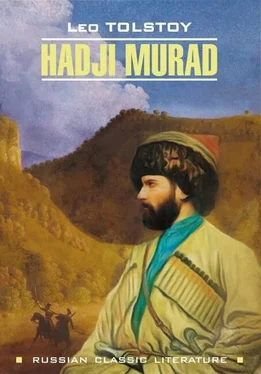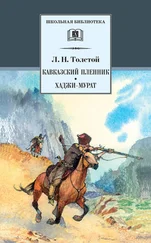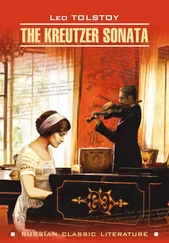Prince Vasili Dolgoruky, Assistant-Minister of War, with an expression of ennui on his dull face – which was ornamented with similar whiskers, mustaches, and temple tufts brushed forward like Nicholas’s – greeted him.
“L’empereur?” 22 22 L’empereur? – The emperor?
said Chernyshov, addressing the aide-de-camp and looking inquiringly towards the door leading to the cabinet.
“Sa majeste vient de rentrer,” 23 23 Sa majesté vient de rentrer – His majesty has just returned.
replied the aidede-camp, evidently enjoying the sound of his own voice, and stepping so softly and steadily that had a tumbler of water been placed on his head none of it would have been spilt, he approached the door and disappeared, his whole body evincing reverence for the spot he was about to visit.
Dolgoruky meanwhile opened his portfolio to see that it contained the necessary papers, while Chernyshov, frowning, paced up and down to restore the circulation in his numbed feet, and thought over what he was about to report to the Emperor. He was near the door of the cabinet when it opened again and the aide-de-camp, even more radiant and respectful than before, came out and with a gesture invited the minister and his assistant to enter.
The Winter Palace had been rebuilt after a fire some considerable time before this, but Nicholas was still occupying rooms in the upper story. The cabinet in which he received the reports of his ministers and other high officials was a very lofty apartment with four large windows. A big portrait of the Emperor Alexander I hung on the front side of the room. Two bureaux stood between the windows, and several chairs were ranged along the walls. IN the middle of the room was an enormous writing table and an arm chair before it for Nicholas, and other chairs for those to whom he gave audience.
Nicholas sat at the table in a black coat with shoulderstraps but no epaulets, his enormous body – with his overgrown stomach tightly laced in – was thrown back, and he gazed at the newcomers with fixed, lifeless eyes. His long pale face, with its enormous receding forehead between the tufts of hair which were brushed forward and skillfully joined to the wig that covered his bald patch, was specially cold and stony that day. His eyes, always dim, looked duller than usual, the compressed lips under his upturned mustaches, the high collar which supported his chin, and his fat freshly shaven cheeks on which symmetrical sausage-shaped bits of whiskers had been left, gave his face a dissatisfied and even irate expression. His bad mood was caused by fatigue, due to the fact that he had been to a masquerade the night before, and while walking about as was his wont in his Horse Guards’ uniform with a bird on the helmet, among the public which crowded round and timidly made way for his enormous, self-assured figure, he had again met the mask who at the previous masquerade had aroused his senile sensuality by her whiteness, her beautiful figure, and her tender voice. At that former masquerade she had disappeared after promising to meet him at the next one.
At yesterday’s masquerade she had come up to him, and this time he had not let her go, but had led her to the box specially kept ready for that purpose, where he could be alone with her. Having arrived in silence at the door of the box Nicholas looked round to find the attendant, but he was not there. He frowned and pushed the door open himself, letting the lady enter first.
“Il y a quelq’un!” 24 24 Il y a quelq’un! – There is someone there!
said the mask, stopping short.
And the box actually was occupied. On the small velvet-covered sofa, close together, sat an Uhlan officer and a pretty, fair curly-haired young woman in a domino, who had removed her mask. On catching sight of the angry figure of Nicholas drawn up to its full height, she quickly replaced her mask, but the Uhlan officer, rigid with fear, gazed at Nicholas with fixed eyes without rising from the sofa.
Used as he was to the terror he inspired in others, that terror always pleased Nicholas, and by way of contrast he sometimes liked to astound those plunged in terror by addressing kindly words to them. He did so on this occasion.
“Well, friend!” said he to the officer, “You are younger than I and might give up your place to me.”
The officer jumped to his feet, and growing first pale and then red and bending almost double, he followed his partner silently out of the box, leaving Nicholas alone with his lady.
She proved to be a pretty, twenty-year-old virgin, the daughter of a Swedish governess. She told Nicholas how when quite a child she had fallen in love with him from his portraits; how she adored him and had made up her mind to attract his attention at any cost. Now she had succeeded and wanted nothing more – so she said.
The girl was taken to the place where Nicholas usually had rendezvous with women, and there he spent more than an hour with her.
When he returned to his room that night and lay on the hard narrow bed about which he prided himself, and covered himself with the cloak which he considered to be (and spoke of as being) as famous as Napoleon’s hat, it was a long time before he could fall asleep. He thought now of the frightened and elated expression on that girl’s fair face, and now of the full, powerful shoulders of his established mistress, Nelidova, and he compared the two. That profligacy in a married man was a bad thing did not once enter his head, and he would have been greatly surprised had anyone censured him for it. Yet though convinced that he had acted rightly, some kind of unpleasant aftertaste remained, and to stifle that feeling he dwelt on a thought that always tranquilized him – the thought of his own greatness.
Though he had fallen asleep so late, he rose before eight, and after attending to his toilet in the usual way – rubbing his big well-fed body all over with ice – and saying his prayers (repeating those he had been used to from childhood – the prayer to the Virgin, the apostles’ Creed, and the Lord’s Prayer, without attaching any kind of meaning to the words he uttered), he went out through the smaller portico of the palace onto the embankment in his military cloak and cap.
On the embankment he met a student in the uniform of the School of Jurisprudence, who was as enormous as himself. On recognizing the uniform of that school, which he disliked for its freedom of thought, Nicholas frowned, but the stature of the student and the painstaking manner in which he drew himself up and saluted, ostentatiously sticking out his elbow, mollified his displeasure.
“Your name?” said he.
“Polosatov, your Imperial Majesty.”
“… fine fellow!”
The student continued to stand with his hand lifted to his hat.
Nicholas stopped.
“Do you wish to enter the army?”
“Not at all, your Imperial Majesty.”
“Blockhead!” And Nicholas turned away and continued his walk, and began uttering aloud the first words that came into his head.
“Kopervine … Kopervine – ” he repeated several times (it was the name of yesterday’s girl). “Horrid … horrid – ” He did not think of what he was saying, but stifled his feelings by listening to the words.
“Yes, what would Russia be without me?” said he, feeling his former dissatisfaction returning. “What would – not Russia alone but Europe be, without me?” and calling to mind the weakness and stupidity of his brother-in-law the King of Prussia, he shook his head.
As he was returning to the small portico, he saw the carriage of Helena Pavlovna, with a red-liveried footman, approaching the Saltykov entrance of the palace.
Helena Pavlovna was to him the personification of that futile class of people who discussed not merely science and poetry, but even the ways of governing men: imagining that they could govern themselves better than he, Nicholas, governed them! He knew that however much he crushed such people they reappeared again and again, and he recalled his brother, Michael Pavlovich, who had died not long before. A feeling of sadness and vexation came over him and with a dark frown he again began whispering the first words that came into his head, which he only ceased doing when he re-entered the palace.
Читать дальше
Конец ознакомительного отрывка
Купить книгу












